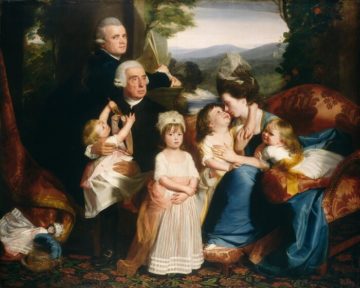by David Kordahl

I’m writing this column in the cool semi-darkness of a municipal auditorium. I will be here for several hours, and my main duty is to stay put. This is the dress rehearsal for a dance recital where my daughters (ages four and six) will perform. When the time comes, I will take a video with my phone.
There is nothing especially noteworthy about this, as I am just one among the dozens of parents in this room, and the millions of Americans elsewhere, who regularly schlep their children from activity to activity. Recently, however, I came across a journal article claiming that these hours spent taking care of children may have political consequences reaching far beyond the cost of dance lessons. “Experimental and cross-cultural evidence that parenthood and parental care increase social conservatism,” a psychology study from 2022 by the international collaboration of Kerry et al., argues that, across the globe, parenthood makes people more conservative.
Specifically, the article claims that parents, on average, have more conservative attitudes than their non-parents on questions involving promiscuity, homosexuality, prostitution, and abortion. Moreover, the article suggests that this relationship may be causal, that parenthood might induce people to adopt conservative attitudes (though only on social issues—not on economics).
As Kerry et al. explain, the route toward parental conservatism is not a matter of conservatives having more kids, but of people becoming conservative once they become parents. By examining survey data across several different countries, the researchers found that social conservatism doesn’t necessarily increase with age. Old non-parents and young non-parents, on average, share similar social sentiments. Why, then, are older people, on average, more conservative? Kerry et al. explain this fact via the confounding variable of parenthood. Old people are more likely to be conservative than young people because they are more likely to be parents.
Readers interested in the details of this analysis may dig into the research article (the preprint is available on PsyArXiv). But now I should come clean. I did not find this article innocently.
I found it because I had noticed, in parenthood, that my own attitudes had become markedly more conservative. I’m not a maniac—most of my explicit stances remain those of any milquetoast democrat—but I can’t deny the shift. I wanted to know if this was normal. And now, upon finding a single research article that claims it is, I will recklessly generalize my own experience.

If parenthood indeed causes people to become more conservative, what is the mechanism? Kerry et al. explain parental conservatism as a form of risk aversion, since “social conservatism serves a threat-management function which helps to buttress institutional safeties.”
This may be true for some parents, but my own experience of parenthood has felt more complicated than that. It may be helpful to establish a baseline. After taking about a decade off from the old “institutional safeties,” I have basically returned. But just how conservative was my background? And to what extent have I changed, or stayed the same?
I was raised as the soft-palmed son of a Lutheran pastor and spent my adolescence in Iowa, where each day I would ride the school bus past feedlots and farmland from our country parsonage to the Calvinist school in town. I felt out of place, but so does every adolescent.
Skip forward fifteen years, and I thought I had left all that baggage behind. I married my college girlfriend, Holly, and followed her to Arizona, where I got a job teaching high school physics. I was well-known to my students as a vegetarian atheist. During my first year teaching, Mormon students would prank me by filling my science bookshelf with LDS literature.
So what happened? Was there some abrupt phase transition, where, after the birth of my first daughter, everything flipped back?
Not really, but close. By the time my older daughter, Iris, was born, I had enrolled in grad school at Arizona State University. The summer before her birth, I read books trying to shore up my picture of the universe (I would need to have the answers, now, right?), but the idea of filling a new person with the bleak worldview I had arrived at in my decade off the reservation seemed pretty unappealing.
At the same time time, I began to reflect on how little of my own understanding of the world had been built on anything so austere as rational argument. That summer I wrote a book review that summarized my developing attitudes:
Much as we might like to imagine ourselves chilly Bayesian rationalists, I suspect that most of us are led to our fundamental beliefs via methods that are much less austere. We go around sniffing the world, rooting through rubble, turning over dirt. After all our searching, many of us find a world that smells like God. Many others (including me) don’t.
Iris’s birth was traumatic—an emergency C-section—and I remember vividly the first time I stopped by ASU campus afterward, as Holly recuperated in the hospital. Imagine the scene: muscular young men on skateboards moving past immaculate young women in yoga pants, a paradisaical sunscape below tall palm trees. I had walked this path hundreds of times before, but now the Freudian scales had fallen from my eyes, and I was rooting my way through a new world.
I felt then what many new parents have felt, that a fundamental facet of the world had been revealed, something that I would find impossible to explain to my uniformly childless and mostly single friends. I was seeing the fire behind the surface of things, seeing that beyond all these enormously complex surfaces lay the simple unwritten truth that all of this had been engineered to encourage its recapitulation, a great conspiracy to encourage the young toward parenthood.

Undoubtedly, this is a reductive way of looking at things. The vision soon passed.
I won’t pretend that the transition to parenthood was always a pleasant one—to quote an understatement from Kerry et al., “Providing (adequate) parental care comes with immense costs in the form of time, money, energy, and resources.” But as I began to spend more and more of my time taking care of Iris, I eventually came to accept this parental responsibility as my primary concern, which is most of what I mean by parental conservatism.
In my most outspoken years as a vegetarian atheist, I imagined that the world was ripe for radical improvement—that it would be possible to engineer a world that inverted the one where I had grown up, with its totalitarian agriculture and overwhelming religiosity. I still think that a better world is possible. But I will not lead the revolution. Parental conservatism entails using the resources of the existing world for the betterment of your children, and accepting this minor role as your own.
By the time my younger daughter, Beatrix, was born, I had more or less fully come around to accept my own limited lack of control in the larger current of world events, and decided that there were aspects of child education that would be nearly impossible to replicate outside of church. We became regular churchgoers. What’s more, after finishing grad school, I got a job in Louisiana, where vegetarianism is regarded with much greater suspicion than voodoo, and I have learned to shut up about it. My girls eat school lunches along with the others.
Is this defensible? I’m not sure. Of course, adopting parental conservatism doesn’t require the wholesale acceptance of regressive social views (cf. Kerry et al.)—it’s more a matter of realizing that you don’t have the luxury of engaging in existential hand-wringing over your own false consciousness. My rehearsal is over, and now I wait in the dark for my daughters to finish theirs.
